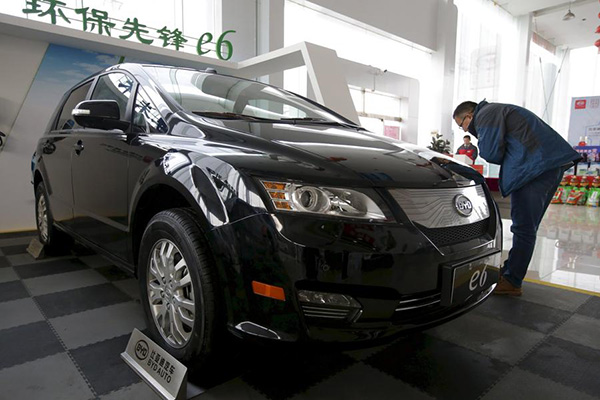BYD electric taxi fleet to start engines in Singapore
 |
|
A customer checks a BYD e6 electric car at a dealership in Beijing, December 9, 2015. [Photo/Agencies] |
New energy vehicle producer BYD Co Ltd announced that it has supplied 100 electric taxis to a new company which is launching its operations in Singapore on Feb 24, bringing the nation its first fully-electric taxi fleet.
The fleet of 100 e-taxis is using BYD's e6 model, which is currently operating overseas in such cities as Brussels and London. In BYD's home city of Shenzhen, Guangdong province, more than 4,000 e6 taxis are currently on the roads.
In a separate statement the operator of the new fleet, HDT Singapore Taxi Pte Ltd, said that acquisition of the BYD electric taxis tied in with the Singaporean government's plans to widen the testing of the viability of electric vehicles, from individual corporate usage to fleet-based, shared-car operations.
Although Singapore had a total taxi fleet estimated at more than 28,280 taxis last year, about 86 percent of them use diesel and seven percent are petrol-electric taxis.
Liu Xueliang, BYD's general manager for the Asia-Pacific region, said his company had been closely involved in the development of Singapore's electric public transportation and it would continue to introduce more e-vehicle types into the country, such as electric tour buses.
Liu said that Singapore, which had also brought BYD's e-truck and e-buses, was an ideal city to develop electric vehicles.
The company began its operations in Singapore in 2014 when 30 e6 hit the roads to provide on-call and leasing services, which had to date collectively driven about three million kilometers.
BYD said that the private-hiring service, run in cooperation with local taxi firm HDT Singapore Taxi, was well-received.
BYD said that the 30 units were all booked within days by locals, who hired them by the month or season.
Last August, 100 e-taxi licenses were granted to HDT, making BYD the first Chinese company to enter Singapore's taxi market. Meanwhile, BYD also introduced its pure electric bus K9 into the nation.
E-buses are a large part of the e-carmaker's revenue source, said Peng Qi, an automobile industry analyst at China Merchants Securities.
However in the domestic Chinese market some cities-such as Shenzhen, whose transport policies supported the company's products-h(huán)ad already replaced all their buses with electric ones.
As a result BYD needed to look for new markets and it was key for it to make inroads with electric passenger vehicles, he added.























